In the streets
| Website: | Herzlich willkommen auf der Seite der QUA-LiS NRW |
| Kurs: | [Q23] In town |
| Buch: | In the streets |
| Gedruckt von: | Gast |
| Datum: | Mittwoch, 31. Dezember 2025 |
Beschreibung
1. Vocabulary - Buildings and places
Here you find some vocabulary about buildings and places in a town.
Hier findest du die Bezeichnungen für Gebäude und Orte in einer Stadt.
| Picture | English | German | In context | Notes |
|---|---|---|---|---|
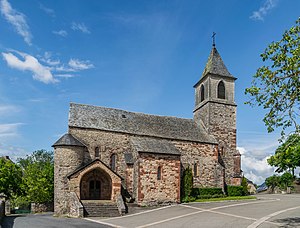 |
the church |
(die) Kirche | On Sundays Christians go to church. | Write something that helps you to learn. |
 |
the school |
(die) Schule | We learn at school. | |
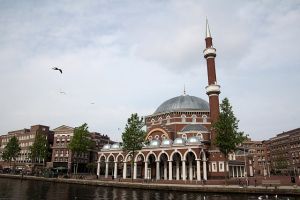 |
the mosque |
(die) Moschee | Muslim men pray in the mosque on Fridays. | |
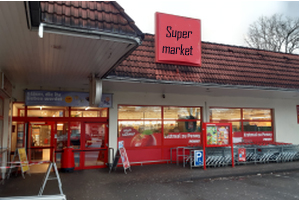 |
the supermarket |
(der) Supermarkt | You can buy all kinds of food in the supermarket. | |
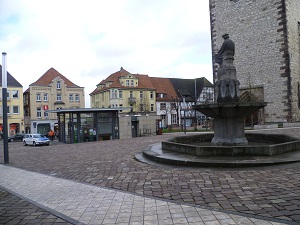 |
the market place |
(der) Marktplatz | The market place is in the centre of the town. | |
 |
the pharmacy |
(die) Apotheke | You get medicine at the pharmacy. | |
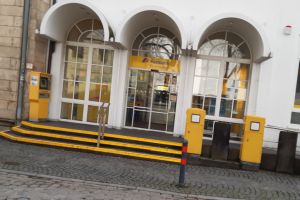 |
the post office |
(die) Post | In the post office you can buy stamps. | |
 |
the cinema |
(das) Kino | You can watch films in the cinema. | |
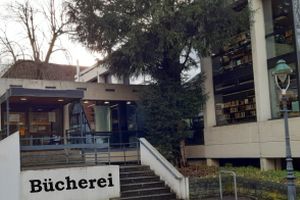 |
the library |
(die) Bücherei | There are many books in a library. | |
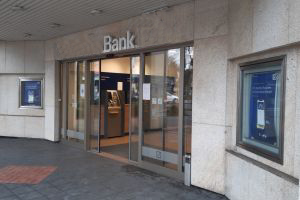 |
the bank |
(die) Bank | You get money at a bank. | |
 |
the shop |
(das) Geschäft | In shops you can buy something. | |
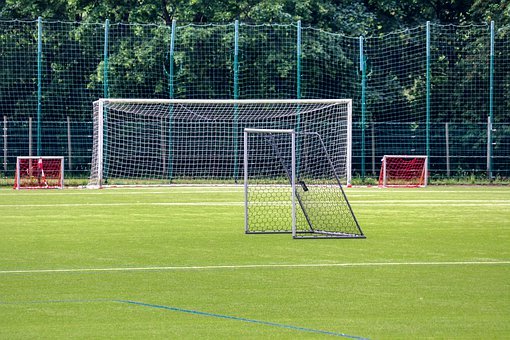 |
the sports ground |
(der) Sportplatz | You play football on the sports ground. | |
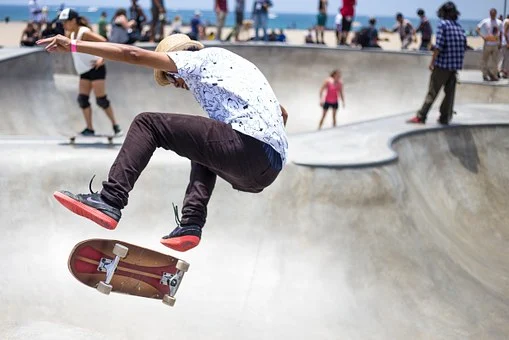 |
the skatepark |
(der) Skatepark | The skatepark is a place for skaters. | |
 |
the hospital |
(das) Krankenhaus | Ill people go to hospital. | |
 |
the town hall |
(das) Rathaus |
The town hall is in the centre of the city. | |
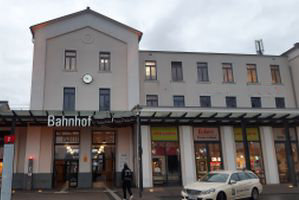 |
the station |
(der) Bahnhof | Trains stop at the station. |
1.1. Dialogue cards
1.2. Flashcards
1.3. Find the pairs 1
learningapps.org: Cookies
1.4. Find the pairs 2 *
learningapps.org: Cookies
1.5. Listen and find the pairs
learningapps.org: Cookies
2. Creative task 1
Take a picture of an interesting place in your town. Upload it in the In town-WIKI.
Write a sentence or a short text about your photo.
Fotografiere einen interessanten Ort in deiner Stadt. Lade das Foto im In town-WIKI hoch.
Schreibe einen Satz oder einen kurzen Text zu deinem Foto.
example:
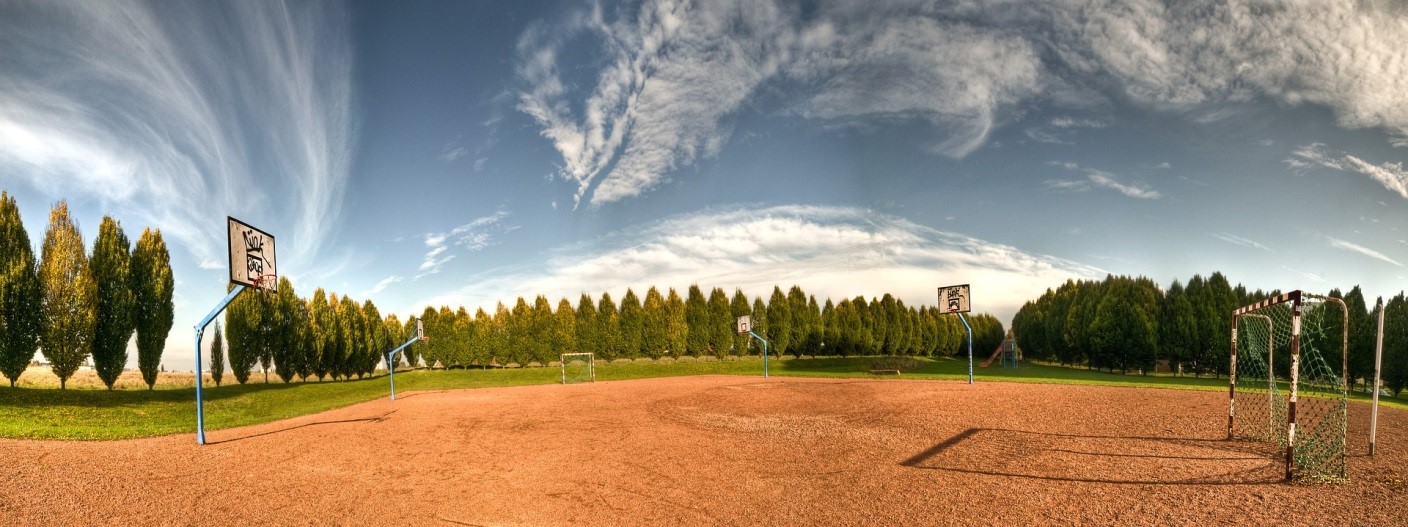
The sports ground
This is a sports ground.
I can play football at the sports ground. I like football.
Every Tuesday I play football with my friends.
Look at your classmates' pictures. Can you write something about their photos, too?
Sieh dir die Fotos deiner Klassenkameraden an. Kannst du auch etwas über ihre Fotos schreiben?
3. Vocabulary - Traffic
| Picture | English | German | In context | Notes |
|---|---|---|---|---|
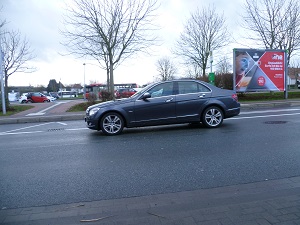 |
the car |
(das) Auto | The car is fast. | Write something that helps you to learn. |
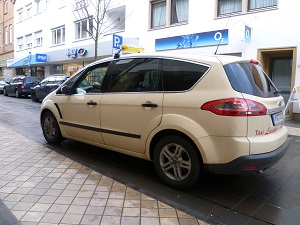 |
the taxi |
(das) Taxi | You take a taxi to the airport. | |
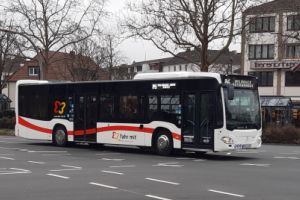 |
the bus |
(der) Bus | You take a bus to school. | |
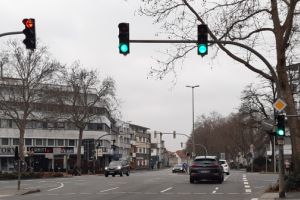 |
the traffic lights |
(die) Ampel | The traffic lights are green. | |
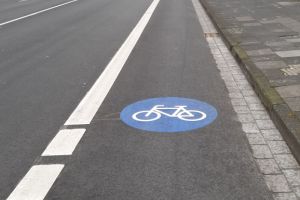 |
the bicycle path |
(der) Fahrradweg | You ride your bike on the bicycle path. | |
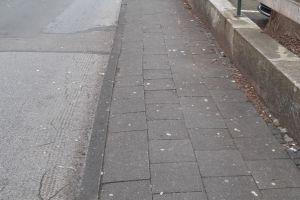 |
the sidewalk |
(der) Bürgersteig/ (der) Gehweg | You walk on the sidewalk. | |
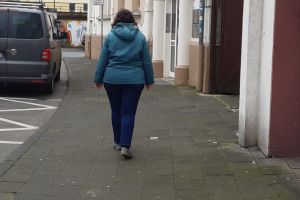 |
the pedestrian |
(die) Fußgängerin / (der) Fußgänger | The pedestrian is going along the sidewalk. | |
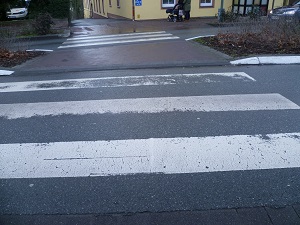 |
the zebra crossing |
(der) Zebrastreifen | Cross the street at the zebra crossing! | |
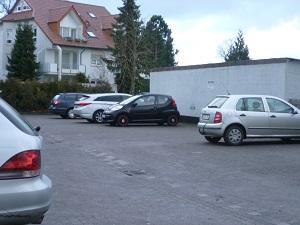 |
car park | (der) Parkplatz | There is a car park behind the supermarket. | |
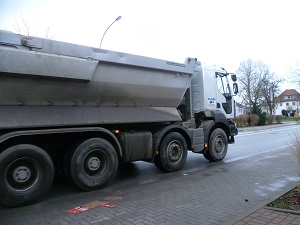 |
the truck |
(der) Lastwagen | The truck is very big. | |
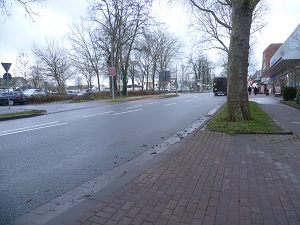 |
the street |
(die) Straße | There are no cars on the street today. | |
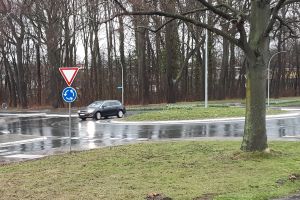 |
the roundabout |
(der) Kreisverkehr | In Great Britain there are many roundabouts. | |
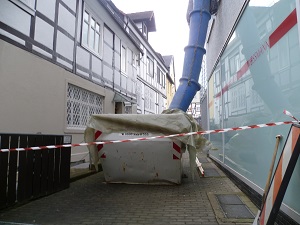 |
the construction site |
(die) Baustelle | The construction site is in the centre of the town. | |
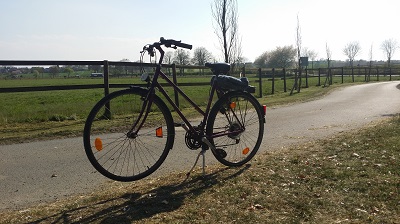 |
the bicycle |
(das) Fahrrad | You ride your bicycle on the bicycle path. | |
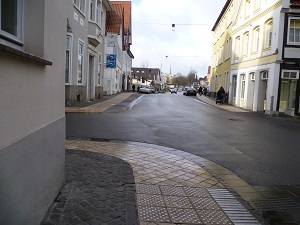 |
the crossing |
(die) Kreuzung | Turn left at the crossing! | |
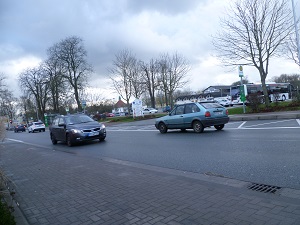 |
the traffic |
(der) Verkehr | Today there is a lot of traffic. | |
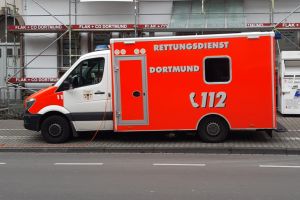 |
the ambulance |
(der) Krankenwagen | The ambulance takes you to the hospital. |
3.1. Dialogue Cards
3.2. Flashcards
3.3. Multiple choice
learningapps.org: Cookies
3.4. True or false
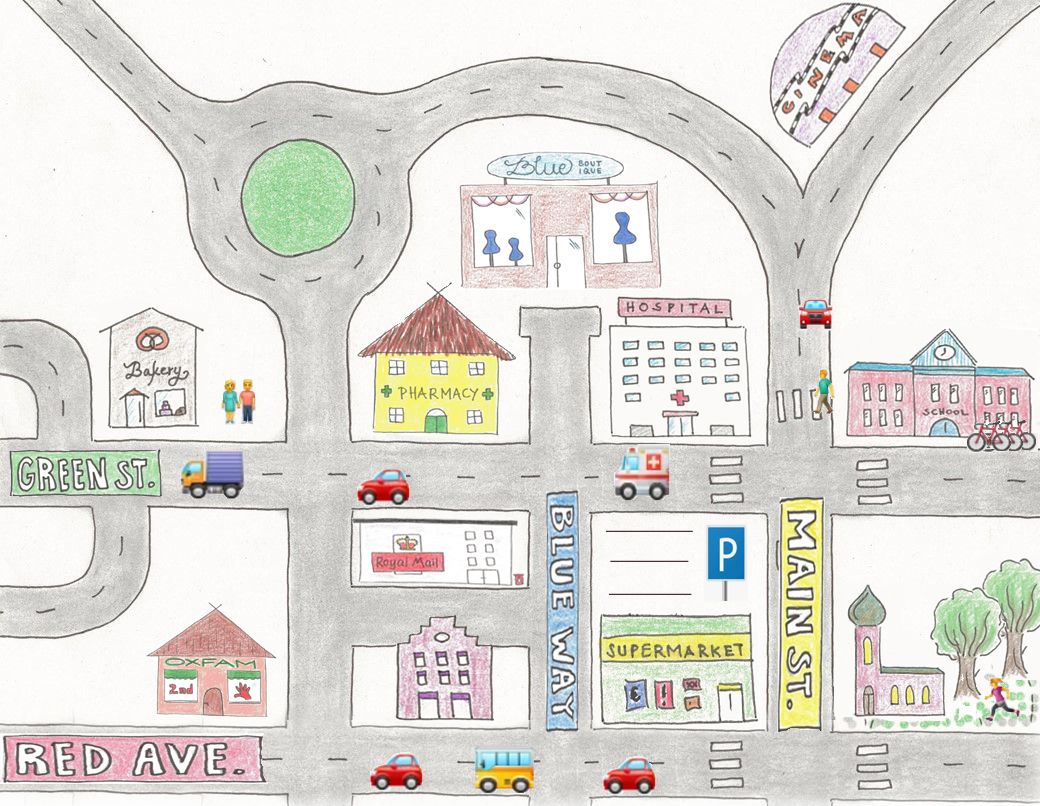
3.5. Paraphrasing (optional)
Paraphrase* three words from this lesson in the dictionary.
Follow these steps:
Step 1: Read two or three entries in the dictionary as an example.
Step 2: Find words that belong to the topic and that are not yet in the dictionary.
Step 3: Create a new entry in the dictionary in the category "At home".
Step 4: Write the word and its German translation in the title.
Step 5: Paraphrase* the word in the dictionary.
Step 6: Write an example sentence with the word.
Extra-Step (creative): If you want, you can add a picture to your entry. You can draw something or take a picture.
Watch the tutorial if you need help.
* "Paraphrasing" means that you explain the vocabulary in your own words for someone who doesn't know it, e.g. "A sneaker is a shoe that you wear for sports."
Erkläre drei Wörter aus dieser Lektion für das "dictionary".
Führe folgende Schritte aus:
Schritt 1: Lies zwei oder drei Einträge im "dictionary" als Beispiel.
Schritt 2: Finde Wörter, die zum Thema gehören, aber noch nicht im "dictionary" stehen.
Schritt 3: Erstelle einen neuen Eintrag für die Kategorie "At home".
Schritt 4: Schreibe das englische Wort und die deutsche Übersetzung in den Titel.
Schritt 5: Erkläre das Wort im "dictionary".
Schritt 6: Schreibe einen Beispielsatz mit dem Wort.
Extra-Schritt (kreativ): Wenn du möchtest, kannst du ein Bild ergänzen. Du kannst etwas zeichnen oder ein Foto machen.
Schau dir das Tutorial an, wenn du Hilfe benötigst.
4. Reading - In town
At the boutique you can buy clothes, for example T-shirts, pullovers, hoodies, jeans, caps, skirts, jackets, dresses and trainers.
At the pharmacy you can buy medicine.
You go to the hospital, when you are very ill or when you had an accident.
At the Oxfam shop you can buy second hand clothes.
At the supermarket you can buy fruit and vegetables, milk, eggs, bread and much more.
4.1. Gap text
Click on the hotspots and read the texts. Then fill in the gaps below.
Klicke auf die Hotspots und lies die Texte. Ergänze dann die Lücken unten.
learningapps.org: Cookies
4.2. Gap text *
learningapps.org: Cookies
4.3. Sort into categories
learningapps.org: Cookies
4.4. Answer questions
Click on the hotspots and answer the questions.
Example: "Where is the school?" - "The school is on Green Street", or "The school is next to the hospital."
If you work with a partner ask and answer the questions in turns. If you work on your own, write down the answers.
Klicke die Hotspots an und beantworte die Fragen.
Beispiel: "Where is the school?" - "The school is on Green Street", oder "The school is next to the hospital."
Wenn Du mit einer Partnerin oder einem Partner arbeitest, stellt abwechselnd einer die Fragen und der andere beantwortet sie. Wenn Du alleine arbeitest, schreibe die Antworten auf.
4.5. Ask questions *
Click on the hotspots and ask the questions that go with the answers.
Example: "You can buy medicine at the pharmacy." - "What can you buy at the pharmacy?", or "Where can you buy medicine?"
If you work with a partner, ask and answer the questions. If you work on your own, write down the questions.
Klicke die Hotspots an und stelle die passenden Fragen zu den Antworten.
Beispiel: "You can buy medicine at the pharmacy." - "What can you buy at the pharmacy?", oder "Where can you buy medicine?"
Wenn Du mit einer Partnerin oder einem Partner arbeitest, stellt abwechselnd einer die Fragen und der andere beantwortet sie. Wenn Du alleine arbeitest, schreibst Du die Fragen auf.
5. Grammar - Quantifiers
To talk about measures you can use quantifiers.
| English | German |
|---|---|
| no | kein / keine |
| a few | wenige |
| a little | wenig |
| some | einige |
| many | viele |
| much | viel |
| a lot of / lots of | viel / viele |
There is a difference between countable and uncountable nouns.
Look at the nouns "water" and "house":
house = countable -> You can use it in combination with numbers (three houses) and therefore it has got a plural form.
| house (countable) | water (uncountable) |
|---|---|
| no houses | no water |
| a lot of/ lots of houses | a lot of/ lots of water |
| a few houses | a little water |
| many houses | much water |
Explanation in German / Erklärung auf Deutsch:
Um Mengen zu bezeichnen werden Mengenangaben verwendet.
Es gibt einen Unterschied zwischen zählbaren und unzählbaren Nomen.
Schau dir die Wörter "Haus" und "Wasser" an:
Mit zählbaren Nomen musst du a few oder many nutzen.
no, some, more, less, a lot of / lots of:
5.1. Find pairs
learningapps.org: Cookies
5.2. Sort into groups
learningapps.org: Cookies
5.3. Gap text - much/ many
learningapps.org: Cookies
6. Creative task 2 - Your street map
This is a street map. But there are no buildings and there is no traffic.
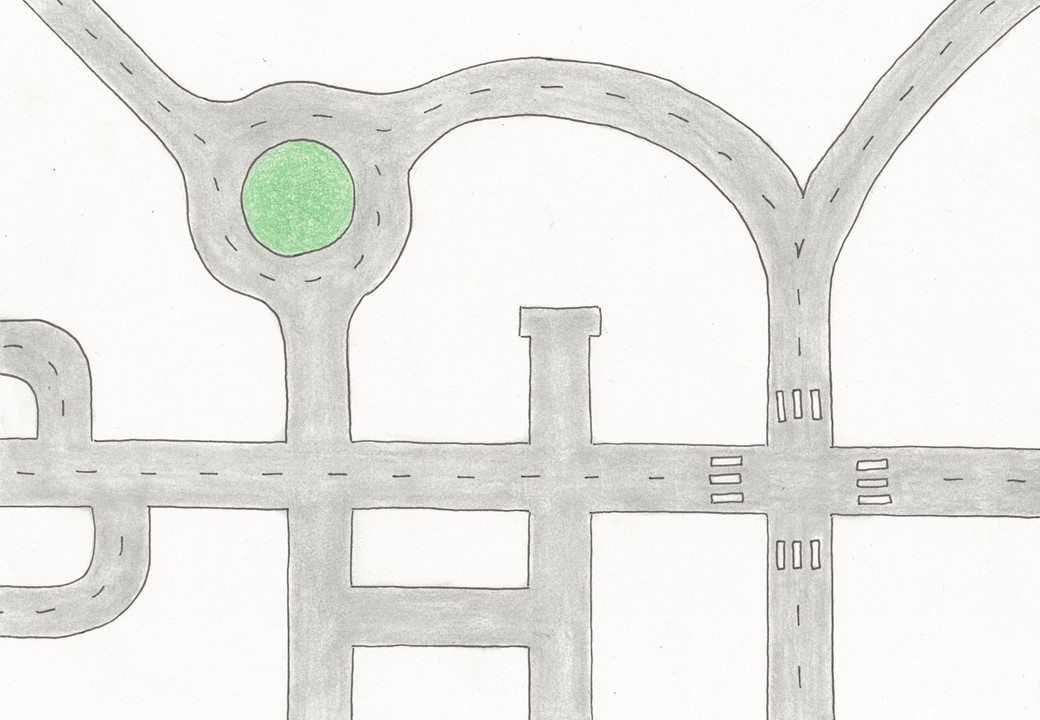
Your task:
Draw a street map of a town and fill it with buildings, cars, people ... Write some sentences about it. Upload your results in the In town-WIKI.
Can you think of more important buildings or places? Find the English words in a dictionary.
Deine Aufgabe:
Zeichne einen Stadtplan und fülle ihn mit Gebäuden, Autos, Menschen ... Schreibe einige Sätze darüber. Stelle dein Ergebnis ins In town-WIKI ein.
Fallen dir noch andere wichtige Gebäude oder Orte ein? Suche die entsprechenden Wörter in deinem Wörterbuch.
Example: In my town there is a big supermarket. There are some cars on the car park. ...